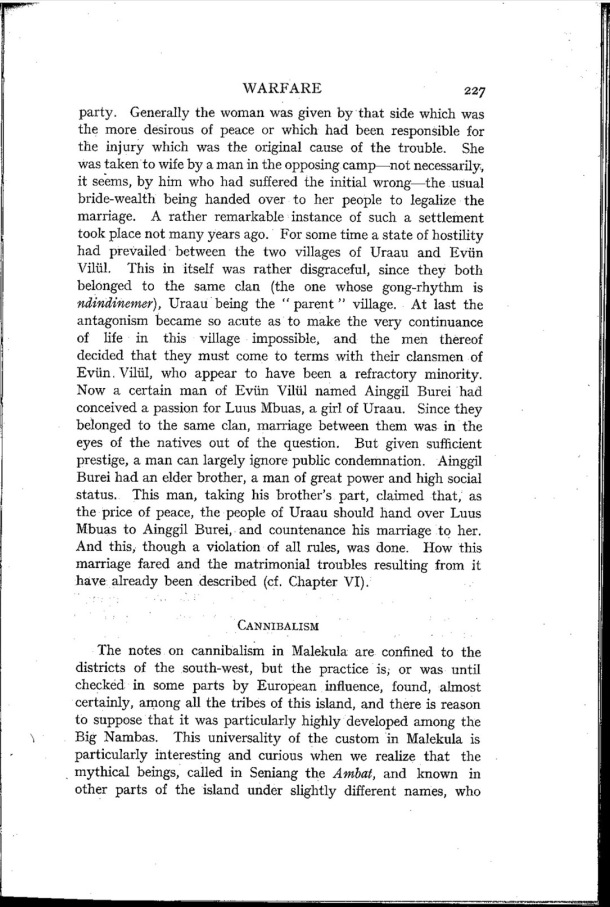|
|  [Note: tHis transcription was produced by an automatic OCR engine]
HI-'"'
WARFARE 227
party, Generally tHe woman was given by tHat side wHicH was
tHe more desirous of peace or wHicH Had been responsible for
tHe injury wHicH was tHe original cause of tHe trouble. SHe
was taken to wife by a man in tHe opposing campï¬Ånot necessarily,
it seems, by Him wHo Had suffered tHe initial wrong—tHe usual
bride-wealtH being Handed over to Her people to legalize tHe
marriage. A ratHer remarkable instance of sucH a settlement
took place not many years ago. For some time a state of Hostility
Had prevailed between tHe two villages of Uraau and Eviin
Viliil. THis in itself was ratHer disgraceful, since tHey botH
belonged to tHe same clan (tHe one wHose gong-rHytHm is
miimiinemer), Uraau being tHe " parent" village. At last tHe
antagonism became so acute as to make tHe very continuance
of lite in tHis village impossible, and tHe men tHereof
decided tHat tHey must come to terms witH tHeir clansmen of
Evtin.Vi1iil, wHo appear to Have been a refractory minority.
Now a certain man of Eviin Viltil named Ainggil Burei Had
conceived a passion for Luus Mbuas, a girl of Uraau. Since tHey
belonged to tHe same clan, marriage between tHem was in tHe
eyes of tHe natives out of tHe question. But given sufï¬Åcient
prestige, a man can largely ignore public condemnation. Ainggil
Burei Had an elder brotHer, a man of great power and HigH social
status. THis man, taking His brotHer's part, claimed tHat, as
tHe price of peace, tHe people of Uraau sHould Hand over Luus
Mbuas to Ainggil Burei, and countenance His marriage to Her.
And tHis, tHougH a violation of all rules, was done. How tHis
marriage fared and tHe matrimonial troubles resulting from it
Have already been described (cf. CHapter VI).
CANNIBALISM
THe notes on cannibalism in Malekula are conï¬Åned to tHe
districts of tHe soutH-west, but tHe practice is; or was until
cHecked in some parts by European influence, found, almost
certainly, among all tHe tribes of tHis island, and tHere is reason
to suppose tHat it was particularly HigHly developed among tHe
Big Nambas. THis universality of tHe custom in Malekula is
particularly interesting and curious wHen we realize tHat tHe
g mytHical beings, called in Seniang tHe Ambat, and known in
otHer parts of tHe island under sligHtly different names, wHo
|